Last Updated on August 5, 2021
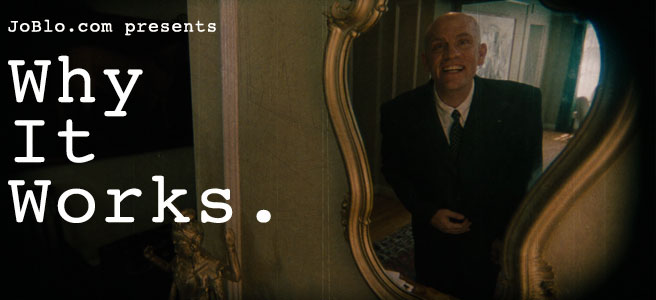 Why It Works is an ongoing column which breaks down some of the most acclaimed films in history and explores what makes them so iconic, groundbreaking, and memorable.
Why It Works is an ongoing column which breaks down some of the most acclaimed films in history and explores what makes them so iconic, groundbreaking, and memorable.
****SPOILERS AHEAD****
I don't know what your favorite puppeteer-finds-a-portal-into-a-famous-actor's-conscience movie is, but mine's probably BEING JOHN MALKOVICH. The feature film debut of both screenwriter Charlie Kaufman and director Spike Jonze is a wonderfully bizarre gem that introduced the world to two unconventional talents and gave us an unforgettable parable of metaphysics, self, and consequence. Also, a chimp has a flashback at one point. Here's why it works:
WHY WE LIKE THE CHARACTERS:
Craig Schwartz, in typical Charlie Kaufman fashion, is a bit of a pathetic specimen. He's passionate about his craft as a puppeteer, but he doesn't seem to have much a direction to his life (even his puppet seems disappointed by its reflection). In fact, the first time we see him go after something is when the married Craig meets the alluring Maxine. Needless to say, we're never really rooting for Craig, but we do have a fascinating and identifiable protagonist in someone whose two volumes seem to be self-loathing and self-entitlement. That said, while we may never be fully on Craig's side, the combination of seeing him suffer and seeing him go after things he badly wants is at least enough for us to tag along for the ride.
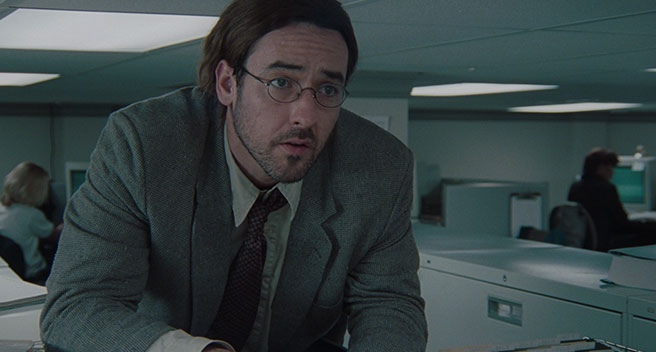 Leave it to John Cusack to charm us even when his character's a tool.
Leave it to John Cusack to charm us even when his character's a tool.
Meanwhile, we have the two diametrically opposed women in Craig's life. His wife, Lotte, is compassionate, somewhat bohemian, and fairly ordinary (at least as far as this film goes), where Maxine is sharp, sexy, and completely without filter. None of the film's main three characters is perfect, but in Lotte we get the closest thing to a sympathetic character, as her motives seem to come from a genuine search for her identity, while Craig's come more from greed and selfishness. Finally, we have the titular John Malkovich, who just wants to live his life without anyone taking field trips inside his head.
 "Don't stand in the way of my actualization as a man, Craig."
"Don't stand in the way of my actualization as a man, Craig."
WHY WE CARE:
An absurd plot is a tricky thing. On one hand, when the premise of your movie is particularly strange, it can be enough to get people interested, but on the other, the story has to actually be about something and eventually go somewhere. In BEING JOHN MALKOVICH, we have a wacky metaphysical escapade but also something of a twisted domestic drama. All else aside, we have a story about a husband and wife, both of whom fall for a woman and will do whatever it takes to win her. It just so happens that the woman in question only wants to be with either one of them when they're John Malkovich, because Charlie Kaufman is an absolute maniac. Even the crazypants part of this story has a simple set of rules, though- there are portals into people's subconscious, and with enough practice you can take control of them. As long as you buy this one bit of magic, everything else follows suit in fairly logical fashion. Finally, MALKOVICH is nothing if not entertaining, and so we have a story that constantly builds momentum through to the finale and provides us with plenty of amusing and weird moments along the way.
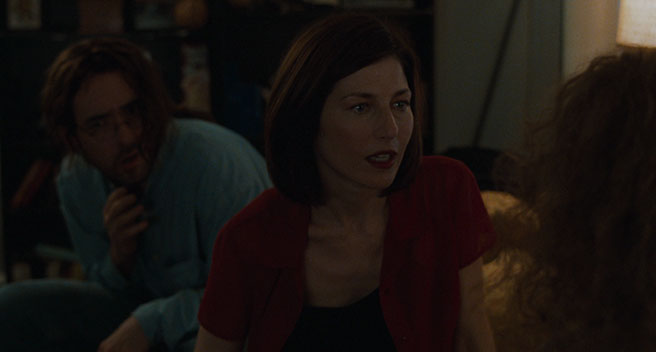 "Lotte, I'm smitten with you. I am… but only when you're in Malkovich."
"Lotte, I'm smitten with you. I am… but only when you're in Malkovich."
WHY WE'RE SATISFIED:
With a movie as goofy as BEING JOHN MALKOVICH, we don't necessarily know who we're rooting for or how we want it to end so much as we're just curious about what's going to happen next. That said, we do end up getting a poignant ending here after all and one that gives a sense of meaning to a seemingly absurd premise. Following a high speed chase through Malkovich's subconscious, Lotte and Maxine embrace each other as Dr. Lester and their friends are able to enter Malkovich permanently, while Craig gets stuck as a passenger inside Emily, the daughter of Maxine and- by way of Malkovich- Lotte. Seven years later, as Lotte and Maxine revel in their love for one another, Craig looks through a narrow opening, begging Emily to look away. There's something both sad and beautiful about seeing Craig stuck in this state, a consequence of his selfishness and his desire to be somebody else, forced to watch the women he loves find happiness in each other.
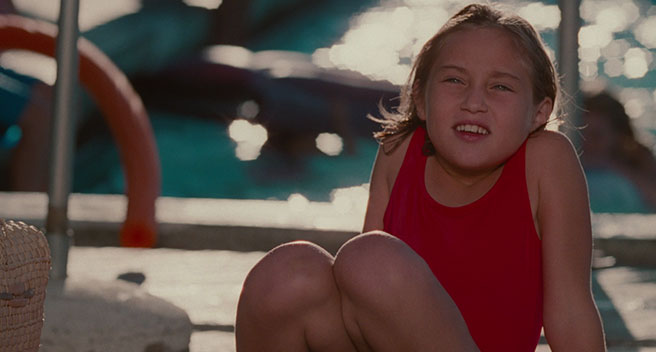 "Oh, look away. Look away. Look away. Look away. Look away. Look away. Look away…"
"Oh, look away. Look away. Look away. Look away. Look away. Look away. Look away…"
WHY WE REMEMBER:
BEING JOHN MALKOVICH is a hard movie to forget, but again, a good film cannot stand on novelty alone. For starters, Charlie Kaufman's script is as witty and hilarious as it is zany. There are plenty of jokes the first time around, but repeat viewings unveil some of the more elegantly crafted witticisms. In perfect contrast to Kaufman's script, Spike Jonze directs the film more like a slice of life character piece than a fantasy or comedy, which goes a long way to keeping us grounded in the central reality of the otherwise surreal. Somewhere in between, Carter Burwell's orchestral score gives us both delicate, somber moments and grand sweeping cuts suitable for the balletic puppet show we're witnessing. In addition to its premise, MALKOVICH gives us plenty of strange moments along the way, from Elijah the chimp's backstory and puppetry's rise to the mainstream to Malkovich's visit into his portal and Lotte and Maxine's adventure into his subconscious (a concept we'd see in more detail in Kaufman's ETERNAL SUNSHINE OF THE SPOTLESS MIND).
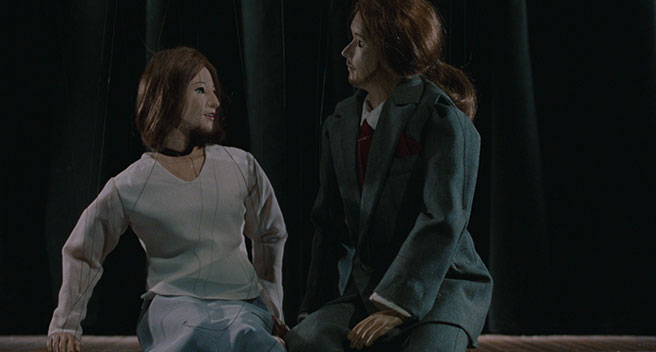 "Tell me, Craig, why do you like puppeteering?"
"Tell me, Craig, why do you like puppeteering?"
The cast is stellar, with John Cusack, Cameron Diaz, and Catherine Keener leading the way, Orson Bean, Mary Kay Place and Charlie Sheen as Charlie Sheen in supporting roles, and cameos from Brad Pitt, Sean Penn, David Fincher, Spike Jonze, and even a pre-fame appearance by Octavia Spencer. Finally, BEING JOHN MALKOVICH is nothing without John Malkovich. Not only does he take on a bizarre, self-refereantial, sometimes self-deprecating role, but he also effectively plays three characters in the film (not counting the hundred or so Malkoviches in the restaurant scene, of course). His Lester-controlled affectation in the epilogue is clear, but note the subtleties of Malkovich's performance when he plays himself as controlled by Craig. You know that way John Cusack seems to turn every sentence into a question? He does it even when the sentence is clearly just a statement? Malkovich absolutely nails that, not to mention the childlike quality he brings to his Craig character compared to the precocious airs with which he plays himself (he said he approached the Malkovich role as he would any fictional character). Charlie Kaufman didn't have a second choice for the titular role, so we should consider ourselves very lucky the actor agreed to undergo such an extraordinary undertaking.
Thoughts? What else worked for you? What didn't? Strike back below!
If you have any movies you'd like to see put under the microscope, let us know below or send me an email at [email protected].










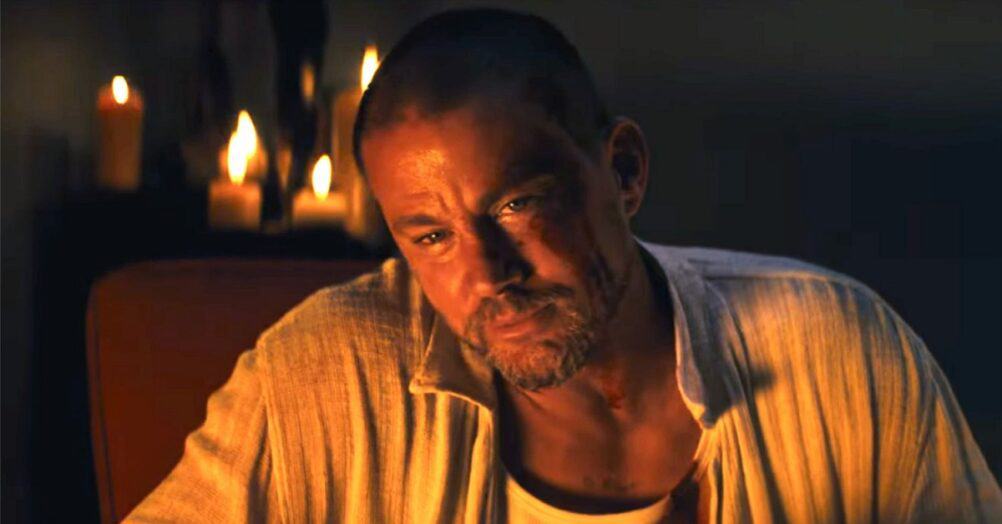









Follow the JOBLO MOVIE NETWORK
Follow us on YOUTUBE
Follow ARROW IN THE HEAD
Follow AITH on YOUTUBE